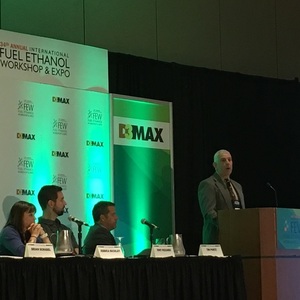FSMA at FEW: Panelists share experiences, advice

LISA GIBSON, BBI INTERNATIONAL
June 13, 2018
BY Lisa Gibson
The Food Safety Modernization Act requires plants to develop and implement procedures they previously hadn’t had to consider, according to Brian Schasel, environmental/technical manager for Big River Resources LLC. “A Food Safety Plan is not something most plants had prior to FSMA,” he said. “We certainly didn’t.”
Schasel spoke on a panel titled “How FSMA Preparation Should Impact Your Facility’s Operations and Maintenance Programs” June 13 at the International Fuel Ethanol Workshop & Expo in Omaha. He illuminated attendees on how Big River Resources overhauled its relevant procedures to comply with the law, which regulates human and animal feed contents. The food safety plan helped speed up FSMA implementation, but there was still a lot to do, he said.
The plant developed Current Good Manufacturing Practices, which sounds intimidating, Schasel said, but is simply a set of formal written procedures. The company also conducted a hazard analysis, which included identifying hazards, rating them and determining which hazards require preventive controls. Some common hazards Big River identified include pests, mycotoxins and physical hazards, among others. Identifying the hazards was followed by preventive controls and hazard management. “What do we do about the hazards we identified?” Schasel said.
Advertisement
Advertisement
Training is another crucial aspect of FSMA compliance Schasel reviewed. “The obvious place to start was with general plant-wide training on FSMA.” Not so obvious was training on personal hygiene, such as hand washing, he added.
The plant has also implemented a recall program, which fellow speaker Tony Rizzardi, senior regulatory specialist for Ecolab Inc., highlighted in his presentation as an important measure. “The biggest challenge is probably trying to stage a mock recall,” Schasel said.
Last, Schasel discussed recordkeeping, saying Big River has a two-year retention time. Fellow panelist Jessica Buckley, senior environmental scientist with RTP Environmental Associates Inc., heavily emphasized keeping records on FSMA compliance, repeatedly telling the audience, “Document everything.”
Advertisement
Advertisement
About 2,000 people are in attendance at the 34th Annual FEW, running June 11 to 13 at the CenturyLink Center.
Related Stories
The European Commission on July 18 announced its investigation into biodiesel imports from China is now complete and did not confirm the existence of fraud. The commission will take action, however, to address some systemic weaknesses it identified.
Kintetsu World Express Inc. has signed an additional agreement with Hong Kong, China-based Cathay Pacific Airways for the use of sustainable aviation fuel (SAF). The agreement expands a three-year partnership between the two companies.
On July 18, U.S. EPA announced a reduction in force (RIF) as the agency continues its comprehensive restructuring efforts. With organizational improvements, EPA is delivering $748.8 million in savings.
Broco Energy on July 17 announced a new partnership with the Massachusetts Port Authority (Massport) to deliver and transition Massport's fuel tanks to renewable diesel across its various facilities.
Shell Aviation, Accenture, and Amex GBT on July 10 announced Avelia is in the process of evolving to an industry solution with independent data hosting and a multi-supplier model helping users access the GHG benefits of SAF.
Upcoming Events










